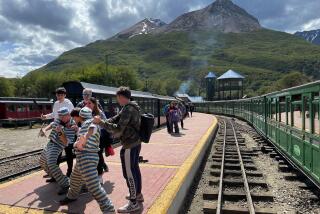Antarctica a Labor of Love for Pioneer
- Share via
USHUAIA, Argentina — The hardest part of living on Antarctica is learning to get along with your companions, says the soldier who pioneered Argentina’s explorations of the white continent.
Former army Brig. Gen. Jorge Leal, the 75-year-old director of Argentina’s Antarctic Department, has spent most of his adult life on Antarctica or working with researchers based there.
Leal founded Esperanza Base, one of his country’s six permanent Antarctic bases, in 1952 and he led Argentina’s first overland expedition to the South Pole in 1965.
Still slender and fit and sporting a curling gray mustache, Leal can’t say for sure how many visits he has made to the continent but estimates about 50. He is planning a February trip to check an ozone-measurement project.
“I was a young captain of mountain troops in 1951 when I became interested in Antarctica and applied to serve there,” Leal said in Ushuaia, the world’s southernmost city, where he addressed a Rotary International conference on the Antarctic.
His application was approved, and Leal spent 2 1/2 years on Antarctica, founding Esperanza Base and then commanding San Martin Base, both on the Antarctic Peninsula.
“In Antarctica the most difficult part is not the cold or the loneliness, or the wind or the snow-covered ice crevices,” he said. “The hard part is learning to live with your companions. It was that way then, and I think it still must be now, although scientific and technological advances have made it much easier to live there.”
He was cheered by the 1991 Madrid Protocol, which banned oil and gas exploration, mining and all other irreversible exploitation in Antarctica for at least 50 years.
Among the research now being conducted on the continent is on carbon dioxide and the “greenhouse effect,” which many scientists believe is causing the Earth’s atmosphere to heat up.
Leal is already convinced that it is happening, saying he has personally observed the effect on Antarctica where “the glaciers have shrunk since 1952.”
“It is terrible what man is doing to his spaceship,” Leal said. “But I believe that if humanity realizes the damage and destruction we are causing, measures will be taken to stop it and repair the damage some way.”
Leal’s eyes sparkle when he recalls his experiences. He retired from the army in 1973 and since 1989 has headed the Antarctic Department, which administers and finances scientific research on the continent.
“For me, nothing involving Antarctica is work,” he said.
More to Read
Sign up for Essential California
The most important California stories and recommendations in your inbox every morning.
You may occasionally receive promotional content from the Los Angeles Times.













